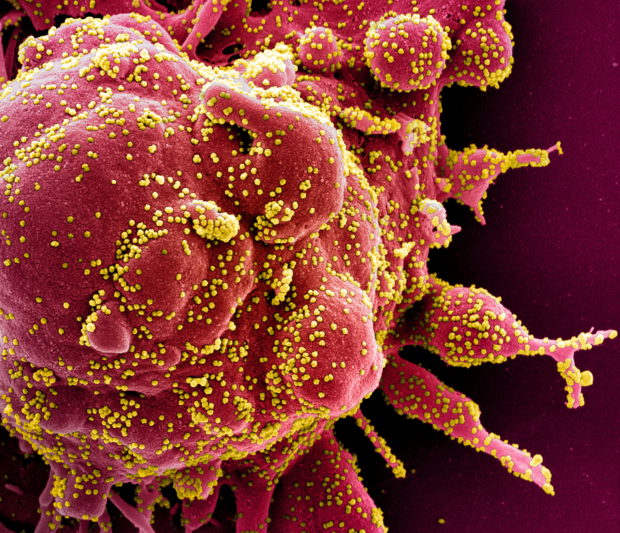DOH: Limited server capacity caused failure to report COVID-19 deaths

FILE PHOTO: Colorized scanning electron micrograph of an apoptotic cell (red) infected with SARS-COV-2 virus particles (yellow), also known as novel coronavirus, isolated from a patient sample. Image captured at the NIAID Integrated Research Facility (IRF) in Fort Detrick, Maryland. National Institute of Allergy and Infectious Diseases, NIH/Handout via REUTERS.
MANILA, Philippines — The “technical issues” the Department of Health (DOH) encountered in reporting additional COVID-19 deaths in the recent days was because its central repository of data related to the pandemic has reached its server capacity, the head of the agency’s epidemiology bureau said Tuesday.
“The server went down from September 23 to September 26. The reason provided to us was that the server already reached its capacity,” Dr. Alethea De Guzman, OIC-Director of the DOH Epidemiology Bureau, said in an online media forum.
“Dahil ito ngayon ang kapasidad ng ating server, nagsabay-sabay kasi ‘yung pagpush ng datos, sumabay din ‘yung pag-e-encode natin ng datos either from the DOH site or from all of our ESUs [Epidemiology and Surveillance Units]. So DICT [Department of Science and Technology] had to find a fix na even if these processes are occurring simultaneously, hindi siya maglilead to the shutdown or hindi ma-o-overwhelm ang system,” she explained.
(Because of the limited capacity of the server, the system shut down when the data was being downloaded and when we encoded data from the DOH site or from our ESUs. So the DICT had to fix the system so that even if these processes are occurring simultaneously, the system will not be overwhelmed or shut down.)
According to De Guzman’s presentation, the COVID Kaya reached its server capacity “to handle, receive, and process bulk data pushed from the CDRS (Central Data Repository System).”
Article continues after this advertisementTo recall, the DOH did not report additional COVID-19 deaths from September 24 to 26 due to “technical issues” in the COVIDKaya system, or the department’s central repository of all data related to the pandemic response. The department finally reported additional deaths on Monday, adding 93 new fatalities in the tally.
Article continues after this advertisementDe Guzman said that while the COVID Kaya system was down, the DOH only manually extracted data that was uploaded to the CDRS. However, since data is directly extracted from the CDRS, case information such as the patients’ death information was not available.
She noted that the encoding or updating of backlogs was only done once the COVID Kaya “became accessible.”
The DOH, in its case bulletin on Monday, said it will report backlog deaths in separate advisories.
De Guzman said that the DICT is trying to identify “immediate and sustainable fixes” to enlarge the capacity of COVIDKaya to avoid the same glitch in the future.
JPV
For more news about the novel coronavirus click here.
What you need to know about Coronavirus.
For more information on COVID-19, call the DOH Hotline: (02) 86517800 local 1149/1150.
The Inquirer Foundation supports our healthcare frontliners and is still accepting cash donations to be deposited at Banco de Oro (BDO) current account #007960018860 or donate through PayMaya using this link.